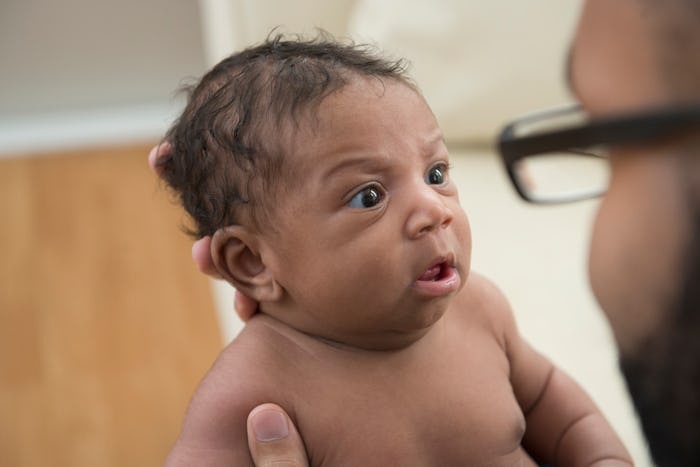Life

As a mom, you go above and beyond to make sure your baby is as healthy as possible. But your child could still be missing out on some key nutrients — vitamin D in particular. That's why you need to know the symptoms of vitamin D deficiency in babies.
“Vitamin D is critical for calcium metabolism, playing a key role in bone and tooth development,” David Hill M.D., pediatrician, author, and spokesperson for the American Academy of Pediatrics (AAP), tells Romper. "We’ve learned that Vitamin D also contributes to healthy immune function and may help prevent diabetes," he adds. That's why the AAP recommends 400 IUs of Vitamin D per day for children in their first year of life. But as WebMD reported, only 5 to 13 % of breastfed infants and 20 to 37 % of formula-fed babies receive the recommended amount of vitamin D, according to the Centers for Disease Control and Prevention (CDC).
While breastmilk is full of beneficial nutrients, vitamin D is the only thing missing, says Dr. Hill, which is why “nursing infants should take a daily Vitamin D supplement.” If your baby is formula-fed, Dr. Hill says they likely won’t need a supplement because infant formula includes vitamin D at the appropriate concentrations.
As your baby gets older, you will be able to provide foods that are rich in vitamin D such as eggs, milk, and certain types of fish. Because the sun is such a critical source of vitamin D, it's important to provide your baby with a supplement during the winter months, according to Science Daily. If you're worried that your baby has a vitamin D deficiency based on symptoms like the following, talk to your doctor about ways you can balance their diet and prevent long-term development issues.
1
Rickets
“More severe vitamin D deficiency is called ‘rickets,’ and it occurs most often between 3 and 18 months of age,” says Dr. Hill. Infants with an extreme vitamin D deficiency can develop this condition, which causes soft, weak bones that can become curved, according to the Vitamin D Council. In fact, Dr. Hill explains, “Low vitamin D levels can even lead to seizures as calcium levels in the bloodstream fall dangerously [and] fractures can be a risk from weakened bones.”
2
Tooth Delay
While no parent enjoys the dreaded teething stage, it’s a necessary part of your child’s development. Unfortunately, inadequate amounts of vitamin D can have an impact your child's teething schedule. Research from the American Journal of Orthodontics and Dentofacial Orthopedics found that a vitamin D deficiency can result in delayed tooth development.
3
Poor Growth
Children with a vitamin D deficiency can experience severely stunted growth, according to the AAP. Because vitamin D is so important to bone development, if your baby isn't getting enough of the essential nutrient, it's likely that the growth of their bones will be negatively impacted.
4
Respiratory Issues
Most babies will experience bouts of colds and flu during the winter months, but a lack of vitamin D will put your baby at risk for longer and more serious respiratory issues. As the Vitamin D Council mentioned, people who have low levels of vitamin D are more prone to developing respiratory infections.
5
Irritability
If you have a very fussy baby and can’t seem to determine the root cause of it, a lack of vitamin D may be to blame. According to the American Academy of Family Physicians, while less obvious, irritability is one of the symptoms that is often associated with a vitamin D deficiency in a baby.
Experts:
David Hill M.D., pediatrician, author, and spokesperson for the American Academy of Pediatrics
This article was originally published on